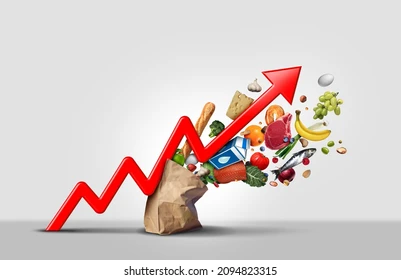In light of the high cost of living vis-a-vis inflation affecting virtually every country of the world, people are being forced to make lifestyle changes to reflect this new reality.
Citizens are now paying more attention to the economic or fiscal policies of the government. And experts in economics have given their opinions on how to slow down inflation. Nigeria, which is almost solely dependent on crude oil is faced with one of the worst inflation in Africa.
At the Lagos Business School (LBS) Breakfast Session, the economic outlook for July 2022 was analysed, and I outlined them below:
- Inflation keeps rising and the cost of production is passed on to the consumer through increased prices of goods/services. Hence, CBN tries to control inflation by increasing the interest rate to 14% in July 2022
- The multiple exchange rates of the naira, it has made the naira quite volatile to the dollar. Eliminating multiple exchange rates and increasing fx inflow would strengthen the naira
- Telecoms and FMCGs are likely to gain by August end. Banking and financial institutions are not so likely
- Transportation has reduced somewhat-the Kaduna-Abuja rail bombing and kidnappings on roads have affected the industry. Aviation is also grappling with safety issues (Dana), temporary closure, etc. In global aviation, Africa recorded 135% despite the surge in aviation. This does not portend well for Nigeria, as it likely means that investors are not coming. Europe tops the continents with 477%.
- Elections would play a big role in 2023. Nigerians need to ensure the next president has extensive knowledge of economics. Since 1999, the present administration has had the worst economic outcomes-reserve without debt is at-0.82
- With a fiscal deficit at 3.09trn and an unsustainable debt, Nigeria is approaching a fiscal cliff
- Apapa Port is still the busiest in Nigeria but quite slow due to the ongoing railroad construction in Apapa. Other ports are underutilised, and as such, these are affecting ship berthing
- NIP transfer has the highest record of transaction value at 29.2bn in July (June was 31.7bn, even though there was a sharp decline in transaction value. POS transaction was the only one that gained in July at 724bn as against 666bn in June. Cheque continues losing its value at 244bn in July as against 277bn in June 2022
 Image credit: shutterstock.com
Image credit: shutterstock.com






Thank you for the summary. The document is quite lengthy.
ReplyDeletePersonally, I’ve cut down on expenses like asoebi, doing my facials and skin routines at home and less eating out- it perfectly makes sense to cook and apportion my own food 😄